How Chinese Skincare Brand Chando Uses Private Traffic to Draw and Engage Customers
Private traffic is a new form of marketing that seeks to avoid reliance on expensive advertising channels. Read more about how Chinese skincare brand Chando is using private traffic to attract, engage, and retain its customers.
by Queenie Yao & Ker Zheng
The concept of private traffic has generated much buzz amongst marketing circles in China over the past few months.
Private traffic, or private domain traffic, is traffic that comes from the brand's own curated channels and tends to be more sticky. The most common example is setting up a 500+ person WeChat group for VIP customers of a particular brand. In such groups, brand employees and shop attendants can send updates regarding discounts, special promotions, gifts, raffles, and even virtual games that the brand is holding for loyal customers.
While in the West, brands use e-mail to keep in touch with their customers, in China, e-mail is less commonly used and brands needed to think of other ways to keep their customers engaged. As new customer acquisition costs through digital advertising and influencer marketing skyrocketed, brands began to turn to such private WeChat groups to better engage and retain their customers.
We take a look at Chinese skincare brand Chando and the way it combines WeChat marketing, livestreaming, and WeChat groups to create its own pool of private traffic.
WeChat Ads + Mini-Program + Livestreaming
Chando is a popular skincare brand that has existed in China for about 20 years. It launched an official WeChat mini-program in September of last year, in order to engage and sell directly to consumers.
What Chando did was use ads to direct people to its WeChat account; sometimes it offered discounts or a trial of free samples to get customers excited. This year in particular, however, the company has used livestreaming to acquire customers.
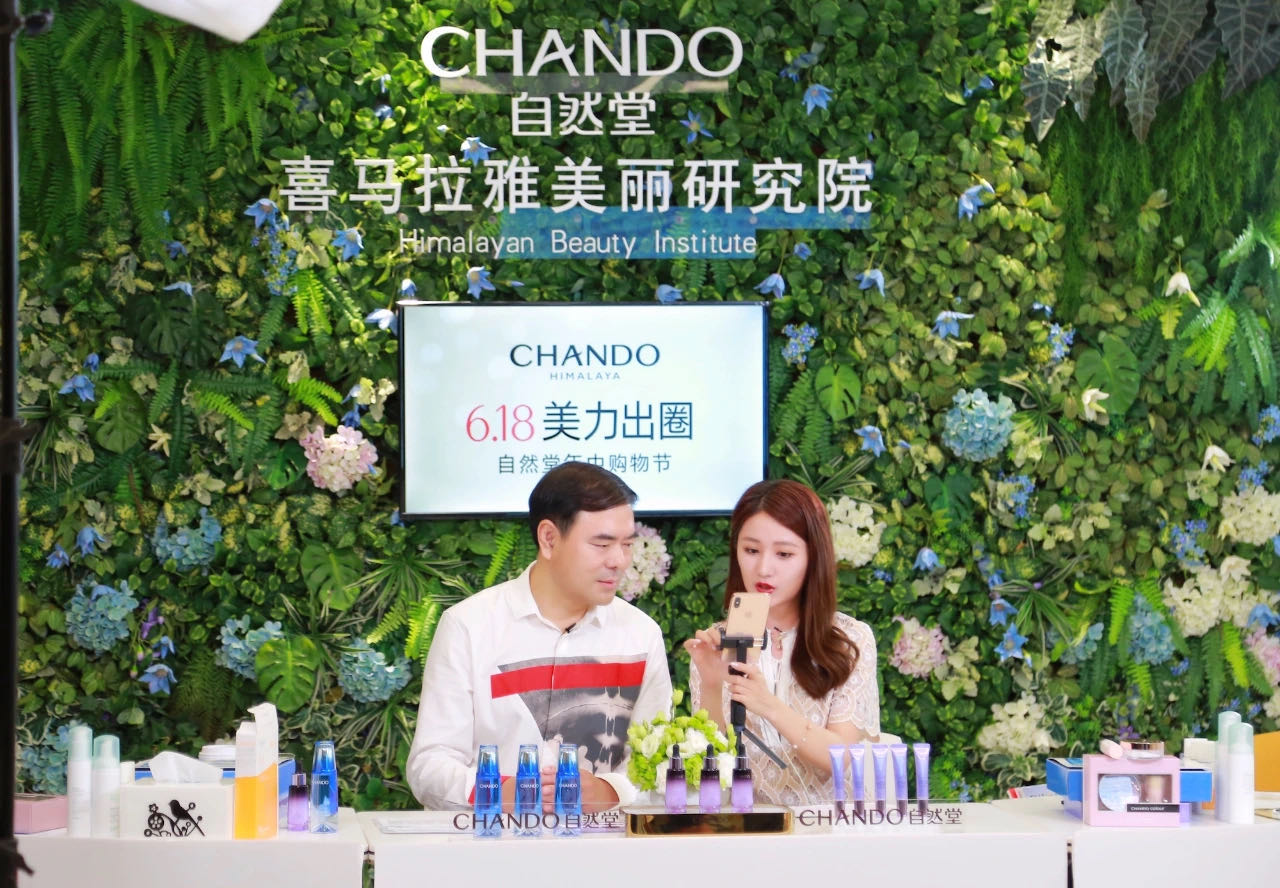
Chando's CEO Mr. Zheng (left) joins a live stream event
Chando’s WeChat mini-program held a special livestreaming event on July 14th, in which the brand’s CEO Mr. Zheng Chunying joined as the main guest. Instead of selling products, the 2-hour live streaming event highlighted the brand's main production lines and R&D laboratories to show how the brand produced its items. According to Tencent Live data, the two-hour live broadcast attracted nearly a million views.
At the same time, the customers could click on a link to go directly to Chando's WeChat mini-program store, where they could register as members and get a 20 RMB cash coupon through scanning QR codes shared by the livestreaming hosts. This coupon could also be used in offline retail stores.
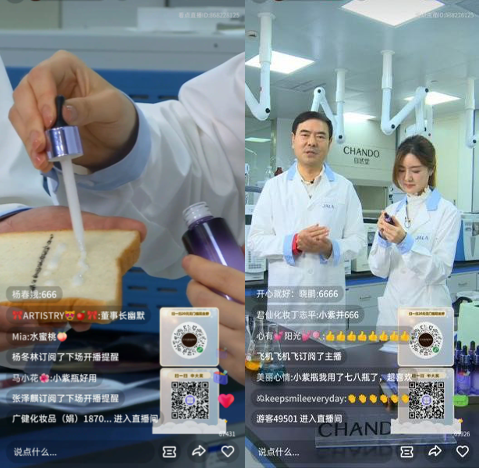
Mr. Zheng at a R&D laboratory
Private WeChat Groups
Chando also set up one-on-one personal customer service functions and established a private VIP WeChat group. These moves were designed to improve customer engagement and direct them to use the newly acquired coupons.
In any case, once consumers enter the mini-program store, they automatically follow the brand's official account and the brand can subsequently send updates in the future.
As part of the omnichannel campaign, staff attendants at offline Chando stores also invited potential customers to join VIP WeChat groups, which continued to notify customers of future promotions and discounts.
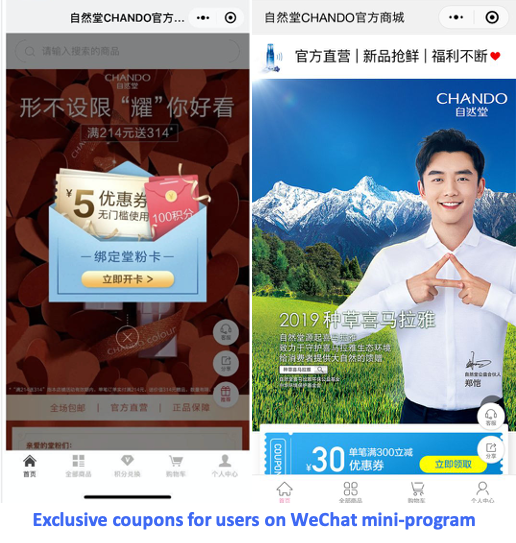
Such private WeChat groups enabled the brand to engage both customers who had already made a purchase, and those who had not.
Private traffic campaigns are also sometimes combined with group-buying deals that incentivize current followers with discounts to bring in new followers, in essence subsidizing new customer acquisition. Since word-of-mouth marketing is particularly effective in China where customers tend to rely on friends and family for recommendations, these group-buying deals have become more and more common over the past two years.
Membership Enrollment
When new users sign up to be members, Chando invites them to fill out an optional survey, which includes questions on their skincare needs, frequently-used skincare brands, age groups, and commonly-used social media platforms. This data is used to craft different customer personas, so that Chando can better cater its value-added services and products to different people.
After members sign up, they are invited to participate in a lucky draw inside the WeChat account. They are entitled to a trial of free product samples, which can play an important role in incentivizing purchases.
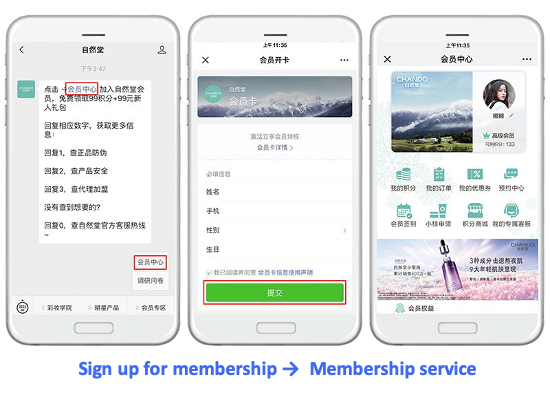
Content Marketing and Product Seeding
Chando created two sections for content on its mini-program store: a product seeding page and a Beauty Academy page.
For the product seeding page, key opinion consumers (KOCs) or beauty influencers are invited to share their experiences on Chando’s products; the format looks a bit like snapshots from Little Red Book, including personal comments and reviews.
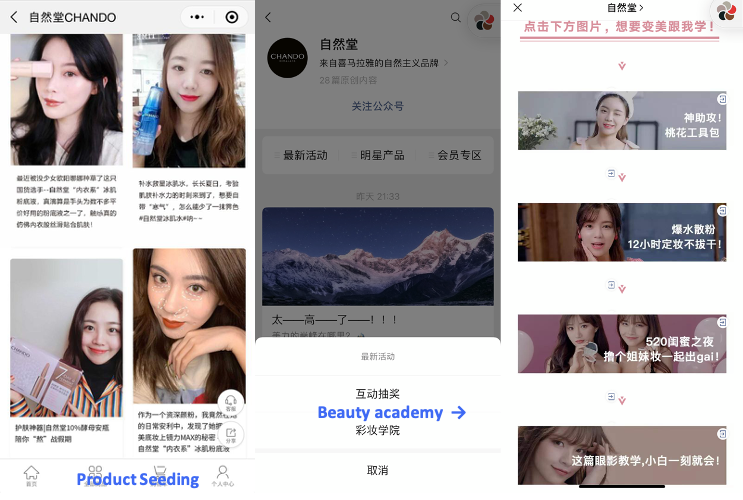
The beauty academy consists of an archive of articles that include makeup tutorials and product information; such content is necessary in China because many people are still new to multi-step makeup processes. Since Chando targets younger customers, this is even more important.
Key Takeaways
1. Private traffic is when brands create their own customer groups to engage them better, without relying on expensive advertising channels.
2. Chando uses a mix of ads, livestreaming, free product samples, and more to encourage people to follow its WeChat account.
3. Chando then invites followers to join VIP WeChat groups, where it can send follow-up campaigns and other promotions.
4. New followers are invited to fill out a survey about their skincare needs and daily habits; Chando uses this data to create customer personas and better cater its value-added services to the right customers.
5. Lastly, Chando also invites customers to provide user-generated content, and has an archive of content for those using its products for the first time.